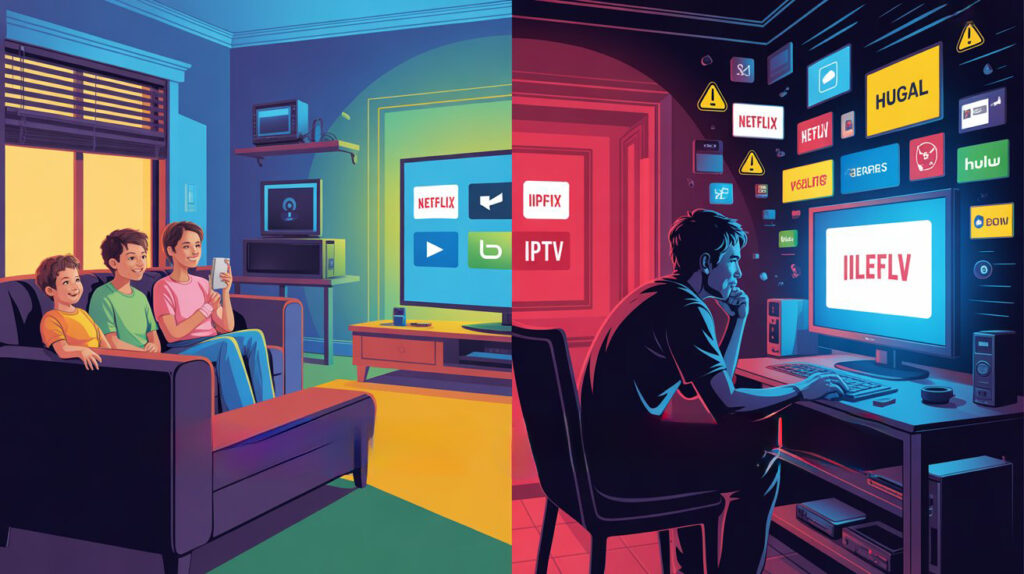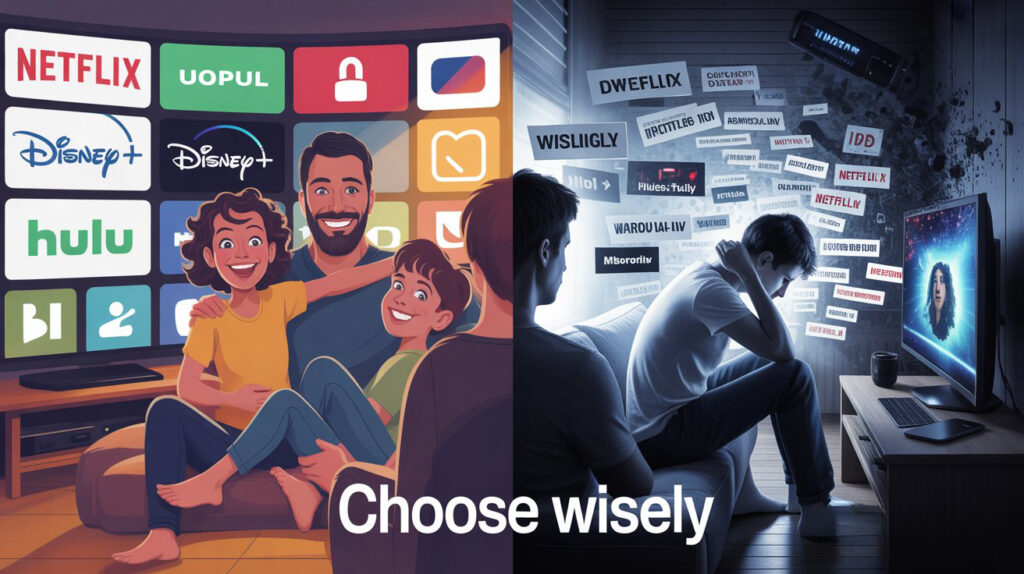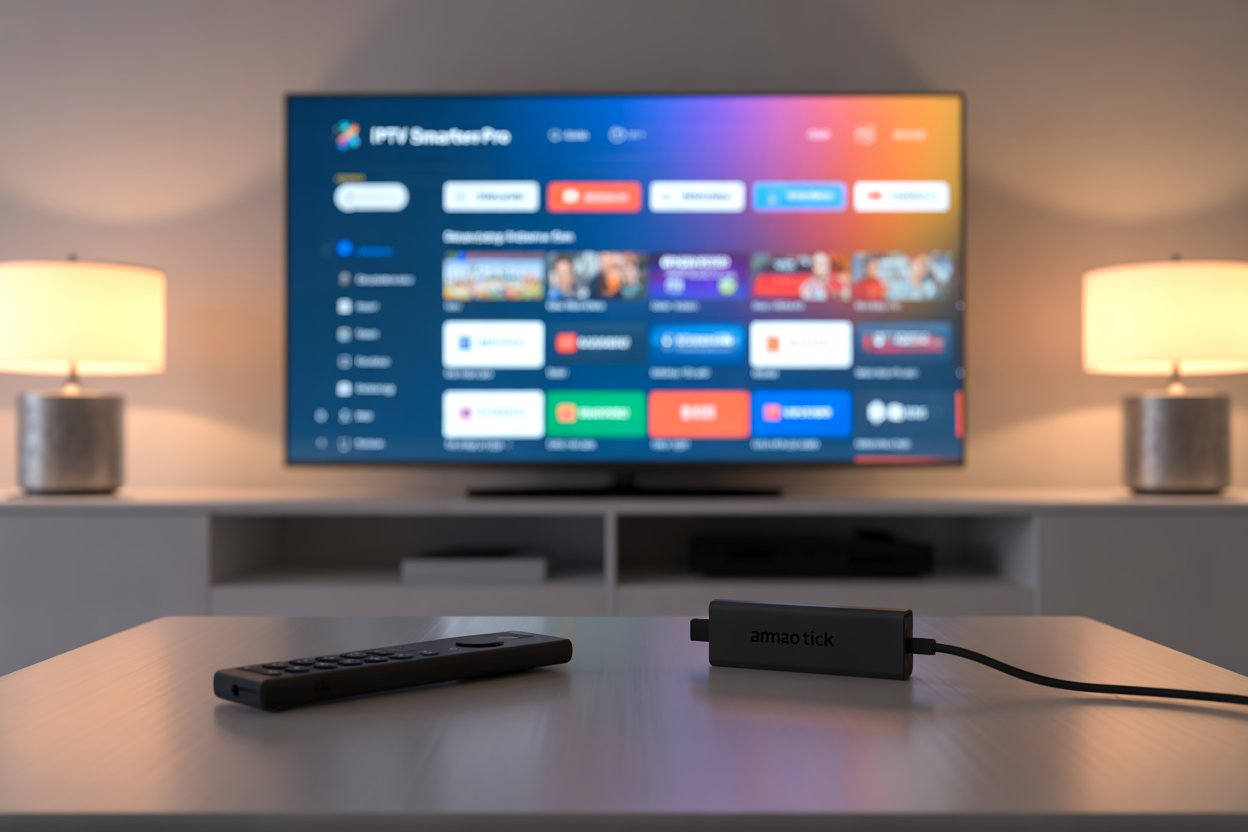1. Introduction
IPTV has exploded in popularity over the past few years, with millions of viewers cutting the cord and streaming their favorite shows, movies, and live sports through the internet. But with this rise has come one burning question: is IPTV legal?
The short answer is: the technology itself is perfectly legal. What makes the difference is whether a specific IPTV service is among the legal IPTV services or falls into illegal IPTV streaming. Some providers are fully authorized and above board, while others operate in a legal grey area—or outright illegally.
Understanding the risks of illegal IPTV is important for anyone considering streaming. Using the wrong service can expose you to fines, malware, or sudden service shutdowns. If you want to be sure, learning how to use IPTV legally from the start will save both trouble and frustration.
If you’re brand new to IPTV and want the basics before diving deeper, check out our full guide: [What is IPTV?]
2. What is IPTV? (Quick Refresher)
IPTV stands for Internet Protocol Television. Instead of relying on traditional cable or satellite signals, it delivers TV channels, movies, and on-demand shows through an internet connection. This makes it highly flexible, allowing users to stream content on smart TVs, computers, smartphones, and more.
The important thing to remember is that IPTV as a technology is legal worldwide. It’s simply a method of delivering television over the internet. Legal issues only arise depending on whether a provider is offering legal IPTV services or engaging in illegal IPTV streaming. Understanding how to use IPTV legally ensures you enjoy your shows without falling into the risks of illegal IPTV.
Curious about how IPTV actually works? We break it down step by step in [Our Beginner’s Tutorial on IPTV].
3. The Difference Between Legal and Illegal IPTV

Not all IPTV services are created equal. The key factor that determines whether an IPTV provider is a legal IPTV service or part of illegal IPTV streaming comes down to licensing.
Legal IPTV services operate like Netflix or Hulu—they buy the rights from content owners and broadcasters to distribute movies, TV shows, and live channels. They’re transparent, often list their partnerships, and sell clear subscription packages.
Illegal IPTV streaming skips this process entirely. They stream and resell copyrighted content without permission, often hiding behind offshore servers, offering rock-bottom prices, and encouraging payments via crypto or gift cards. Being aware of the risks of illegal IPTV can save users from fines, scams, or malware.
For those wanting a safe option, knowing how to use IPTV legally helps you choose verified, licensed providers that protect both your viewing experience and your legal standing.
Looking for trustworthy options? Check out our [Best IPTV Providers 2025] guide — all verified, licensed, and safe to use.
4. Why IPTV Legality Matters
The legal side of IPTV isn’t just about the providers — it also impacts users. Copyright law is strict, and in many countries, streaming or distributing pirated content carries serious consequences.
Take the UK, for example: under the Digital Economy Act 2017, both providers and users of illegal IPTV streaming can face fines and even imprisonment. Enforcement agencies such as Ofcom and intellectual property regulators actively monitor and shut down unlicensed operators.
By sticking to legal IPTV services and learning how to use IPTV legally, users can enjoy their favorite shows and live sports without worrying about penalties or hidden risks of illegal IPTV.
Want to make sure you’re always on the right side of the law? Read our guide on [How to Use IPTV Safely and Legally].
5. Risks of Illegal IPTV
While cheap or free access to premium channels is tempting, the risks of illegal IPTV are significant.
For providers: operating without licenses can result in huge fines, lawsuits, and even prison sentences in some countries.
For users: accessing illegal IPTV streaming services can expose you to malware, scams, and sudden service shutdowns. Even where prosecution is rare, the legal implications are real.
Choosing legal IPTV services avoids these dangers and ensures a secure and stable viewing experience. Learning how to use IPTV legally protects both you and your family from unnecessary risks.
Our tutorial on [How to Stay Safe While Using IPTV] covers practical steps to protect yourself online.
6. How to Tell if an IPTV Service is Legal

With so many services on the market, it’s not always easy to know which are legitimate. A few rules of thumb:
Signs of a legal IPTV service: clear subscription plans, official partnerships, transparent websites, and customer support.
Red flags for illegal IPTV streaming: prices that seem too good to be true, offshore hosting with no transparency, and payments via crypto or gift cards only.
By understanding the risks of illegal IPTV and following tips on how to use IPTV legally, you can make informed choices and enjoy a secure streaming experience.
Need help choosing wisely? See our [Comparison Review of IPTV Services] to spot the differences between licensed and shady providers.
7. Global Perspectives on IPTV Legality
IPTV technology is legal worldwide, but unlicensed streaming is not. Laws and enforcement vary by region:
- United Kingdom: strict enforcement under the Digital Economy Act 2017; users of illegal IPTV streaming can face penalties.
- European Union: countries like the Netherlands and Sweden actively crack down on unlicensed distributors.
- North America: the US and Canada treat unauthorized IPTV as copyright infringement, focusing on providers but users still face risks of illegal IPTV.
Using legal IPTV services and knowing how to use IPTV legally ensures compliance no matter where you live.
For detailed, country-specific guidance, check our [Regional Guide to IPTV Legality].
8. Ethical & Consumer Considerations
Beyond legality, your viewing choice affects the content industry. Piracy through illegal IPTV streaming drains revenue from creators, studios, and sports leagues, reducing investment in new shows and events.
Legal IPTV services provide a safe, ethical alternative while giving viewers flexibility and affordability. Understanding how to use IPTV legally not only protects you but supports the entertainment ecosystem.
Looking for budget-friendly, licensed options? Explore our [Affordable Legal IPTV Services List] — updated monthly.
Conclusion: The Safe Way to Enjoy IPTV
The truth is simple: IPTV as a technology is legal. What matters is whether the service you choose respects broadcasting rights and protects you as a viewer. The gray market is full of tempting offers, but it often comes with risks—unstable streams, legal uncertainty, or hidden dangers.
That’s why choosing a reliable provider is everything. With HOT IPTV, you don’t have to second-guess legality or safety. Our service is built to deliver:
- Peace of mind — no need to worry about licensing headaches.
- Security — personalize your channels, protect your family, and stream without hidden risks.
- Quality & stability — access international football, movies, series, and more with confidence.
👉 Ready to try it yourself? Start with a FREE 24H trial and see why thousands trust HOT IPTV.
👉 Want to compare us to other providers before deciding? Read: Best IPTV Subscriptions in 2025.














